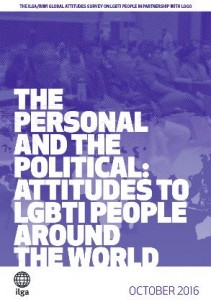 GENEVA–Today, the International Lesbian, Gay, Bisexual, Trans and Intersex Association (ILGA) shares the second round of results of the ILGA-RIWI Global Attitudes Survey on LGBTI People in partnership with Logo. This is a new annual survey to gather credible data on public attitudes to particular issues related to sexual orientation, gender identity, gender expression and sex characteristics on every continent, and this release comes just a few days ahead of World Statistics Day to be celebrated on October 20.
GENEVA–Today, the International Lesbian, Gay, Bisexual, Trans and Intersex Association (ILGA) shares the second round of results of the ILGA-RIWI Global Attitudes Survey on LGBTI People in partnership with Logo. This is a new annual survey to gather credible data on public attitudes to particular issues related to sexual orientation, gender identity, gender expression and sex characteristics on every continent, and this release comes just a few days ahead of World Statistics Day to be celebrated on October 20.
Developed in cooperation with the Canadian technology company RIWI Corp. and in partnership with the US entertainment brand Logo, the survey collected answers to 31 questions from 96,331 online individuals in 65 countries. Significantly, the survey reached environments highly hostile to LGBTI people, such as Saudi Arabia and Iraq, resulting in the largest investigation of attitudes towards LGBTI people around the world ever conducted.
While the first report, released in May 2016, looked at sexual orientation as its predominant subject, this second output, titled The Personal and the Political: Attitudes towards LGBTI People around the World, allows a deeper analysis into global attitudes also to gender identity, gender expression and to a lesser extent, intersex issues. It also shows relevant differences in how people respond at a personal level to encountering LGBTI people or issues, when compared to more ideological or political attitudes they may hold.
At a global average, for example, this survey shows that 67% of the world (strongly or somewhat) agrees that human rights should be applied to everyone regardless of their sexual orientation or gender identity or expression. “All the countries surveyed returned results over 50% in favour of this proposition, even those considered among the most hostile to sexual and gender minorities,” comments Aengus Carroll, co-author of the research. “This clearly demonstrates that countries’ legal policy and international practice can be very contradictory when compared to attitudes declared by their citizens.”
When people know each other first-hand, a de-stigmatising effect is often produced, countering the stereotyping too often perpetuated by religious and political leaders, as well as in media. At the global level, 46% of respondents know someone lesbian, gay or bisexual, while only 28% of respondents directly know someone who does not identity with the gender they were assigned at birth, or identifies as transgender.
Data also seem to show that wide awareness of issues related to sex characteristics, or intersex, still needs to emerge in societies, as 38% of respondents have no opinion on whether children whose sex characteristics are unclear at birth should be surgically assigned a gender by medical professionals, and not by a person looking after the welfare of the child.
Other data seem to show a significant bridge between what people feel is permissible at the personal level and the laws that govern sexual behaviour and expression: 38% of respondents globally feel that adults should be allowed to have private, consensual same-sex relationships. Interestingly, when extending the question to a matter of law (‘Should being lesbian, gay, bisexual, trans or intersex be a crime?’), it is seen that only 26% feel that such behaviours or expressions should be criminalized.
“Public attitudes in both hostile and friendly nations are not as extremely negative as might have been feared,” commented Renato Sabbadini, Executive Director at ILGA. “However, this does not erase the fact that violence and discrimination inflicted on sexually and gender diverse people all around the world continues unabated, and indeed is increasing in places. Too often we still see sexual and gender minorities being convenient scapegoats for leaders who are looking for support from more conservative sectors of their society.”
Proponents of traditional values often attempt to denaturalize diversity by framing it as something chosen or adopted in a person, rather than being an innate attribute. At the global level, only one quarter (23%) of respondents seem to feel people are ‘born that way,’ and only 21% of the world either ‘strongly’ or ‘somewhat’ disagree that gender is assigned at birth and always fixed.
On the other hand, though, it is evident that attitudes are changing: 52% of respondents either strongly or somewhat agree that bullying of LGBT young people is a significant problem; 65% of respondents globally have ‘no concerns’ if their neighbour were gay or lesbian (with extremes ranging from a 43% found in Africa to the 83% recorded in Oceania). Virtually identically, at the global level 64% of respondents would have no concerns if they were unable to identify their neighbour’s gender at first sight.
“Sexual and gender minorities are often the first casualty when traditional values are being appealed to,” comment Ruth Baldacchino and Helen Kennedy, Co-Secretaries General at ILGA. “This is why this global survey, with its evidence-based and non-anecdotal data, is a powerful tool for the advancement of human rights of LGBTI people around the world: it offers significant opportunity to inform the public about actual prevailing attitudes, and thereby assist not only LGBTI human rights defenders, but also agencies and governments, as well as regional and international organisations, in the efforts to reduce stigmatization of LGBTI people. Information and knowledge can indeed contribute to changing the world and the lived realities of many people worldwide who are still facing human rights violations.”











